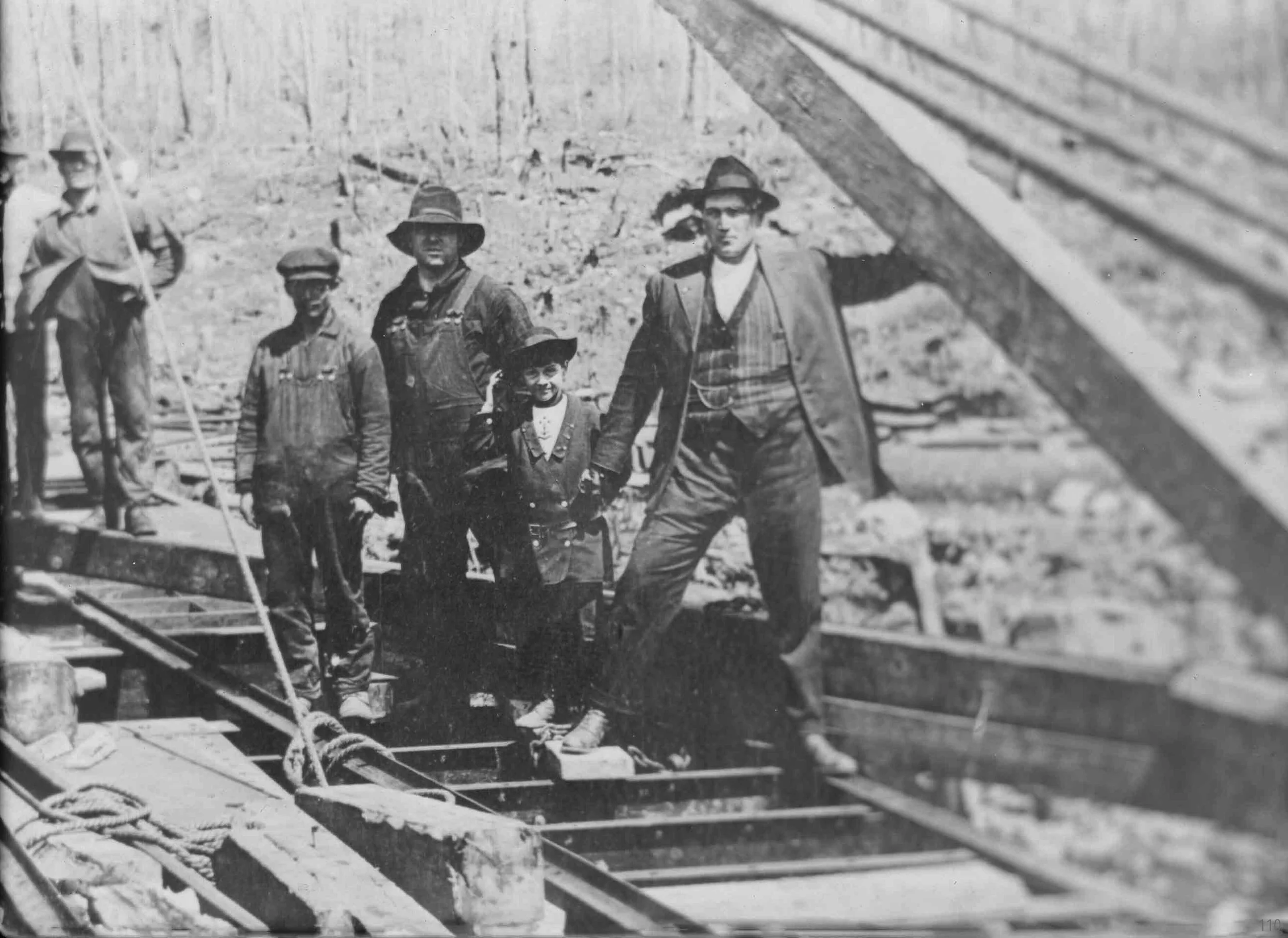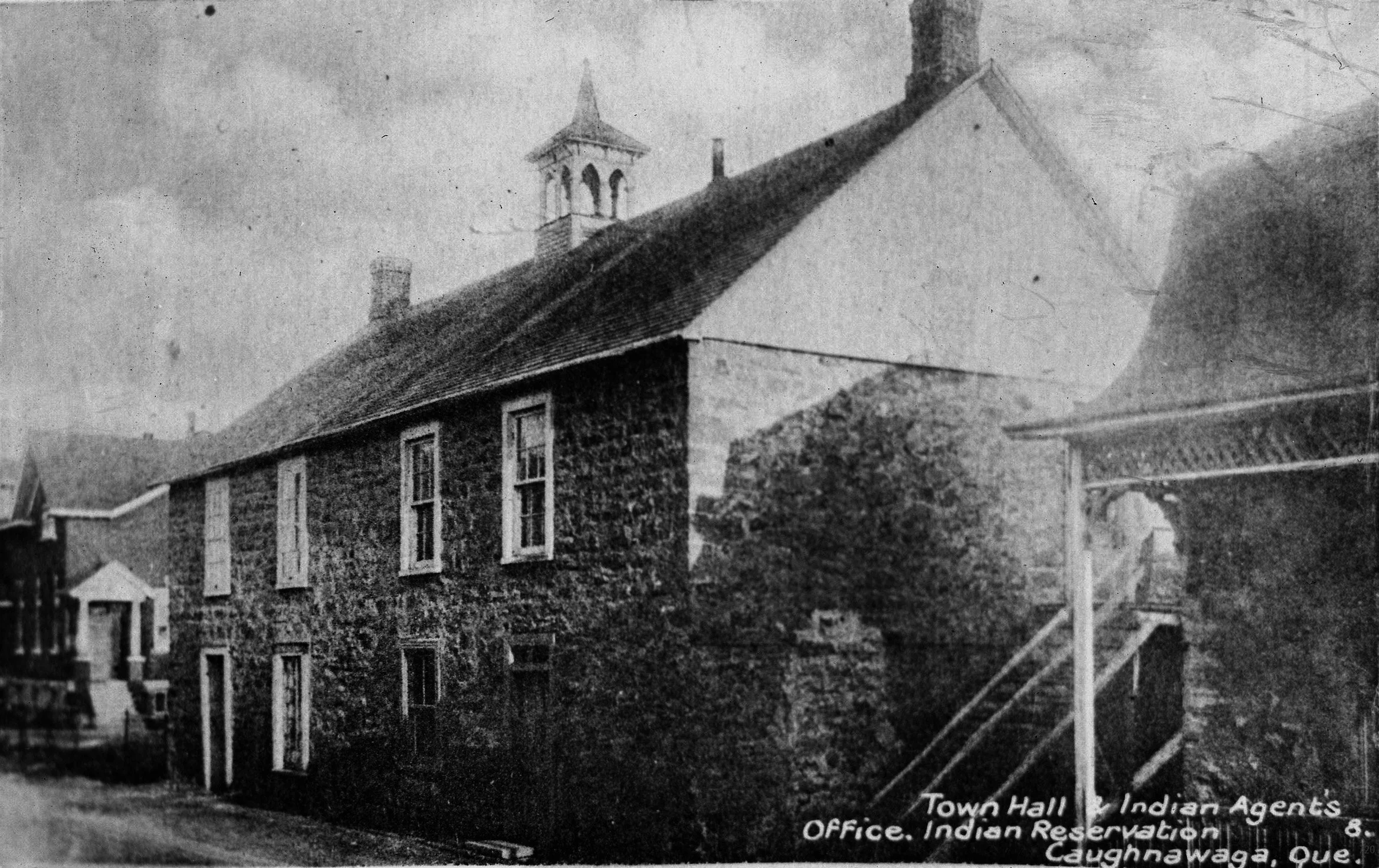Indian Agents
A group of men standing at what appears to be a railroad construction site. (Courtesy: Kanien’kehá:ka Onkwawén:na Raotitióhkwa Language and Cultural Center)
Story told by Mary Claus
There isn’t an Indian agent anymore. I remember them. There were different ones. The government liked to get their Indian agents from the military, see, cause it was just after the war. All these guys are coming back and need some cushy post, and they’d give ‘em a few Indians to manage.
Their stay never seemed to last a long time. But there wasn’t a schedule. The RCMP used to have the policy of moving their detachments on the rez. They’d rotate them out every two years. The theory was, they didn’t want the RCMP to form attachments in a given community. That would interfere with their jobs. So, the guys were only allowed to stay for two years at a time. But see, I don’t know how widespread that was. Across the country, the histories of these institutions vary because, well, the situations of the communities are so varied. It’s almost like a case-by-case basis.
One Indian agent that I recall, I don’t think he was a military man, he was a bit of an idiot. He was putting his foot in his mouth all the time. He wasn’t very smart. At least that was the local opinion. He was short and chubby and pale. That I remember.
Yeah, when mum and dad were building their house, he came along. He came along and said, “Boy the government is building you a really nice house.” This really, really annoyed my father because the government wasn’t building them a house. He and mum, they were building their house together, got the financing for it and all that. The government didn’t have anything to do with it. So, dad let him know that. That was a stupid assumption, you know, based on stupid stereotypical stuff.
But there were other Indian Agents that were more militaristic. And there were stories of the guys, Indian Agents, at Six Nations being military-like. Strict and stupid. Colonial. Colonial masters, they felt themselves to be.
A lot were British too. I wonder how come. Maybe because they were familiar with colonies. See, maybe they had experience in South Africa or Australia - where they tried to control people. Then the role just gradually dried up as us Indians took more and more charge, in whatever way we got it.
KANIEN’KÉHA VERSION
↓
KANIEN’KÉHA VERSION ↓
Ratihétien
Kahnawake’s former town hall & Indian agent office, prior to its destruction from burning down. (Courtesy: Kanien’kehá:ka Onkwawén:na Raotitióhkwa Language and Cultural Center)
Mary Claus IAKOKÁ:RATON
Iah káneka téshre's ne Rahétien. Kheiè:iahre' ronónha. Kwah ó:ia' nihatiia'tò:ten. Wahonon'wéskwen' ki' wáhi ne kakoráhsera' ne ronterí:ios raotinèn:rakon enhshakotiia'tará:ko' raononkwè:ta' ratihétien, ase'kén, òn:wa'k shonteriiohserén:ta'ne'. Akwé:kon tontahón:ne' kí:ken ronterí:ios tánon' tehonatonhontsó:ni ka'k nón:we ionaktí:io taonsahatí:ta'ne' tánon' tohkára niionkwehonwehserá:ke shos enhshakotí:ion' ahshakonatsté:riste'.
Kwah iah nonwén:ton ísi' nón:we sewenhnì:ta tehonatonhontsanentákton. Nek tsi iah tekaién:tahkwe' iontenonionnià:tha ahatíhsere'. Thí:ken Ronanonhwaro'tsherowá:nen's rotiianerenhseraién:tahkwe' tsi kanonstá:ton nonkwá:ti ahshakotì:teron' raotinenhra'shòn:'a. Teiohserakehátie' tensehshakotiia'tatenión:ko'. Kwah nè:'e wate'nikonhranákerehkwe' tsi ne Ronanonhwaro'tsherowá:nen's iah tehón:nehre' sótsi tahontén:ro'ne' ne kanakeráhsera'. Né: se' enkaió'tate' tsi nahò:ten' ronateríhonte'. Thò:ne ki', nek ón:ton' teiohserakehátie' wahonterakén:rie'. Nek tsi, iah tewakaterièn:tare' tó: niió:re' aktéhson nón:we ne shà:ka tsi nítioht. Né: teiaonhontsiià:kon, ó:ia' na'tekakarò:ten's tsi nihotiia'tawénhseron ase'kén, é:so ó:ia' na'teiawénhseron ne tsi kanakerahserakehrón:ton. Kwah á:ienhre' tsi skanakerahserátshon tsi ní:ioht tsi kaka'én:ion.
Kè:iahre' kí:ken shaià:ta rahétien, iah í:kehre' raterí:ios té:ken, kwah tsi ní:ioht ne thotiá:ro'kte'. Kwah tió:konte' ratateha'tánions. Iah kwah tehattókha'. Aró:nen ki' nì:'i wà:kehre' eh nahò:ten'. Ken' nihahneniésha tánon' roia'táre'sen tánon tehotskenné:nonte. Tho ki' ní:ioht tsi kè:iahre'.
Orihwí:io, shihonatenonhsonnihátie' nistén: tánon' rákeni, thò:ne wahokè:tohte'. Wahokè:tohte' wahèn:ron', "Ótkon é:so tsi kanonhsí:io ietshinonhsonnién:ni ne kakoráhsera'." Kwah tokèn:'en nè:'e wa'thoterien'takáriahte' ne rake'níha ase'kén iah tó:kenske' té:ken tsi kakoráhsera' ronwatinonhsonnién:ni. Raónha tánon' istén:, skátne nen' nè:'e ronatenonhsón:ni, wahnihwistatshén:ri' tánon' akwé:kon nahò:ten' karátie'. Kwah iah othé:nen ronónha tehonatsteríston ne kakoráhsera'. Thò:ne ki', rake'níha wa'tho'nikonhrató:kenhte' eh nahò:ten'. Thotiá:ro'kte' se' tsi ok thiahanonhtónnionhwe' eh nahò:ten', wáhi, tsi iah othé:nen orì:wa' té:ken tka'nonhkwaientáhkwen.
Ki' tánon' rón:ne'skwe' nó:ia' Ratihétien néne sénha ronatste'niá:ron tsi ronterí:ios tsi nihotirhò:ten. Kakaraién:tahkwe' se' néne ronónha iakoia'tahnótha', Ratihétien, ne Ohswé:ken nonkwá:ti néne ronatste'niá:ron tsi ronterí:ios. Rati'niakátste' tánon' thonatiá:ro'kte'. Rontonhontsáhkhwas tsi nihotirihò:ten. Ratikowá:nen's rontonhontsáhkhwas, kwah tsi ní:ioht tsi wahontatón:ni'.
É:so rá:ti Tiohrhen'shakahón:we nahatiia'tò:ten' ò:ni'. Oh ne kèn:'en tiorì:wa'. Tóka' nòn:wa tsi ó:nen shihatirihwaienté:ri nahò:ten' ne watonhontsáhkhwen tsi niiorihò:ten. Hé:, tóka' nòn:wa South Africa tóka' ni' Australia tethonatohétston - tsi wahonte'nién:ten' ahshakonatia'takwe'ní:ioste' nón:kwe. Sok thò:ne skenen'shòn:'a tonstáthen' tsi eh nihatiiéhrha' tsi ì:'i iationkwehón:we sénha wa'akwatatewenní:io'ne', kwah tsik ní:ioht tsi wa'onkwá:ton'se'.
Written by: Teyohá:te Brant, Local Journalism Initiative Reporter
Translated by: Karonhí:io Delaronde


